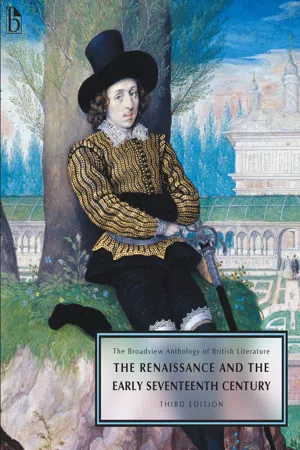
The Broadview Anthology of British Literature Volume 2: The Renaissance and the Early Seventeenth Century - Third Edition
- 1,002 pages
- English
- PDF
- Available on iOS & Android
The Broadview Anthology of British Literature Volume 2: The Renaissance and the Early Seventeenth Century - Third Edition
About this book
In all six of its volumes The Broadview Anthology of British Literature presents British literature in a truly distinctive light. Fully grounded in sound literary and historical scholarship, the anthology takes a fresh approach to many canonical authors, and includes a wide selection of work by lesser-known writers. The anthology also provides wide-ranging coverage of the worldwide connections of British literature, and it pays attention throughout to issues of race, gender, class, and sexual orientation. It includes comprehensive introductions to each period, providing in each case an overview of the historical and cultural as well as the literary background. It features accessible and engaging headnotes for all authors, extensive explanatory annotations, and an unparalleled number of illustrations and contextual materials. Innovative, authoritative and comprehensive, The Broadview Anthology of British Literature has established itself as a leader in the field.
The full anthology comprises six bound volumes, together with an extensive website component; the latter has been edited, annotated, and designed according to the same high standards as the bound book component of the anthology, and is accessible by using the passcode obtained with the purchase of one or more of the bound volumes.
For the third edition of this volume a considerable number of changes have been made. Newly prepared, for example, is a substantial selection from Baldassare Castiglione's The Courtier, presented in Thomas Hoby's influential early modern English translation. Thomas Kyd's The Spanish Tragedy is another major addition. Also new to the anthology are excerpts from Thomas Dekker's plague pamphlets. We have considerably expanded our representation of Elizabeth I's writings and speeches, as well as providing several more cantos from Edmund Spenser's Faerie Queene and adding selections from Sir Philip Sidney's Arcadia. We have broadened our coverage, too, to include substantial selections of Irish, Gaelic Scottish, and Welsh literature. (Perhaps most notable of the numerous authors in this section are two extraordinary Welsh poets, Dafydd ap Gwilym and Gwerful Mechain.) Mary Sidney Herbert's writings now appear in the bound book instead of on the companion website. Margaret Cavendish, previously included in volume 3 of the full anthology, will now also be included in this volume; we have added a number of her poems, with an emphasis on those with scientific themes.
The edition features two new Contexts sections: a sampling of "Tudor and Stuart Humor, " and a section on "Levellers, Diggers, Ranters, and Covenanters." New materials on emblem books and on manuscript culture have also been added to the "Culture: A Portfolio" contexts section.
There are many additions the website component as well—including Thomas Deloney's Jack of Newbury also published as a stand-alone BABL edition). We are also expanding our online selection of transatlantic material, with the inclusion of writings by John Smith, William Bradford, and Anne Bradstreet.
Frequently asked questions
- Essential is ideal for learners and professionals who enjoy exploring a wide range of subjects. Access the Essential Library with 800,000+ trusted titles and best-sellers across business, personal growth, and the humanities. Includes unlimited reading time and Standard Read Aloud voice.
- Complete: Perfect for advanced learners and researchers needing full, unrestricted access. Unlock 1.4M+ books across hundreds of subjects, including academic and specialized titles. The Complete Plan also includes advanced features like Premium Read Aloud and Research Assistant.
Please note we cannot support devices running on iOS 13 and Android 7 or earlier. Learn more about using the app.
Information
Table of contents
- Contents
- Preface
- Acknowledgments
- The Renaissance and the Early Seventeenth Century
- History of the Language and of Print Culture
- John Skelton
- Sir Thomas More
- William Tyndale
- Contexts: Religion and Devotional Life
- Sir Thomas Wyatt
- Henry Howard, Earl of Surrey
- The Elizabethan Sonnet and Lyric
- Literature in Ireland, Gaelic Scotland,and Wales
- Baldassare Castiglione / Thomas Hoby
- Lady Jane Grey
- Edmund Spenser
- Sir Philip Sidney
- Mary Sidney Herbert, Countess of Pembroke
- Elizabeth I, Queen of England
- Contexts: Culture: A Portfolio
- Mary Stuart, Queen of Scots
- Aemilia Lanyer
- Sir Walter Ralegh
- Contexts: Other Lands, Other Cultures
- Thomas Kyd
- Francis Bacon
- Robert Southwell
- Christopher Marlowe
- Contexts: Tudor and Stuart Humor
- William Shakespeare
- Isabella Whitney
- Contexts: “Unconstant Women,” “Excellent Women”: A Seventeenth-Century Debate
- Ben Jonson
- Thomas Dekker
- John Donne
- John Webster
- Lady Mary Wroth
- Thomas Hobbes
- Robert Herrick
- George Herbert
- Andrew Marvell
- Margaret Cavendish
- Katherine Philips
- Royalist and “Cavalier” Poetry
- John Milton
- Contexts: Levellers, Diggers, Ranters, and Covenanters
- Reading Poetry
- Maps
- Monarchs and Prime Ministers
- Glossary of Terms
- Permissions Acknowledgments
- Index of First Lines
- Index of Authors and Titles
- Blank Page